By Micheal Rios, Tulalip News; photos by Matika Wilbur
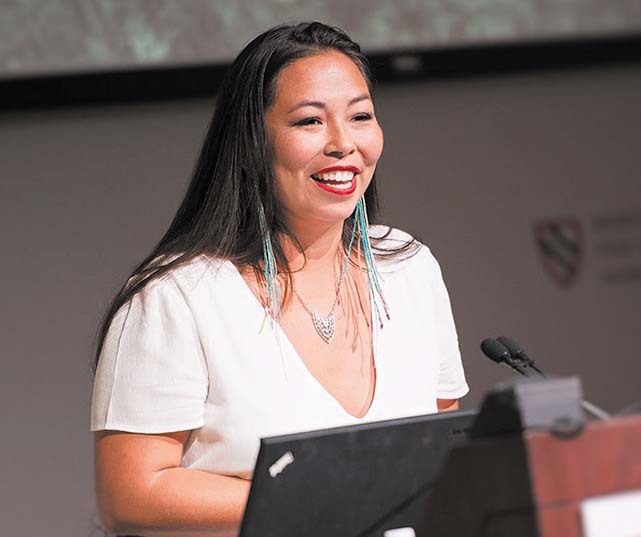
It’s been nearly a decade since Tulalip tribal member and celebrated visual storyteller Matika Wilbur made the bold decision to sell nearly everything she owned to begin an unprecedented journey of collecting the boundless beauty of Native American culture. Her journey is known as Project 562, a multi-year national photography project dedicated to photographing over 562 federally recognized tribes in the United States.
To unveil the true essence of contemporary Native issues and the magnitude of tradition, Matika travelled hundreds of thousands of miles, many in her RV dubbed ‘the Big Girl’, but also by horseback, train, plane, boat and on foot across all 48 continental states, Hawaii, deep into the Canadian tundra and into Alaska. The depths of her travels reflect her steadfast commitment to visit, engage, and photograph at least 562 federally recognized tribes, while also revealing her passion to inspire and educate.
“While teaching at Tulalip Heritage High School and attempting to create a photography curriculum with a narrative that our children deserve, I found an outdated narrative. It’s an incomplete story that perpetuates an American historical amnesia. It’s a story that’s romantic and dire…it’s the story of extinction,” she recalled of the circumstances that led to her life changing journey.
Matika points out the extinction theme often associated with Native America is easily perceived by doing a quick Google Images search. If you search for ‘African American’, ‘Hispanic American’ or ‘Asian American’, then you’ll find images of present day citizens who represent each culture. You’ll see proud, smiling faces and depictions of happy families. But if you search for ‘Native American’ the results are very different. You’ll see mostly black and white photos of centuries old, stoic Natives who are “leathered and feathered”.
“All of these images and misconceptions contribute to the collective consciousness of the American people, but more importantly it affects us in the ways that we imagine ourselves, in the ways we dream of possibility,” she explained.
And so began her multi-year mission to photograph and collect stories of contemporary Indigenous citizens from the hundreds of sovereign nations that make up Native America. As her photography portfolio continued to expand, so too did her realm of possibility.
Today, the now 37-year-old Matika has come to realize that Indigenous identity far surpasses federal acknowledgement. There are state-recognized tribes, urban and rural Native communities, and other spaces for Indigenous identity that don’t fall under the U.S. government’s recognition. Astonishingly, she estimates she has photographed close to 1,000 different tribal communities.
In a respectful way, Matika has been welcomed into one tribal community after another because they not only support her project whole-heartedly, but also because they desire to see things change. From media coverage to Google Images search results to what’s written in history books, Native Americans deserve an accurate portrayal of their vibrant, color-filled imagery and oral histories that have been passed down for generations.
Conversations about tribal sovereignty, self-determination, holistic wellness, historical trauma, decolonization of the mind, and revitalization of culture accompany the vast collection of photographs, videos, and audio recordings Matika has diligently collected. This creative, consciousness-shifting work will be widely distributed through national curricula, artistic publications, exhibitions, and online portals.
Melding powerful storytelling with video, photography and song, Matika expanded on her experiences photographing Native American women across the hundreds of sovereign nations she has visited for nearly a decade during her special guest appearance at the Mount Baker Theatre in Bellingham. Her captivating June 3rd presentation was at a social distanced max capacity. Upon concluding the audience showed their respect for the evening’s eye-opening and heartwarming cultural exchange with a loud standing ovation.
“So far I’ve had the opportunity to share my journey with audiences at museums, universities, conferences, and galleries across the United States,” stated Matika. “I strive to share stories and photographs of contemporary Indigenous people as the positive role models I know them to be.
“The most amazing part of the journey has been the generosity, kindness, and knowledge that Native people have offered me. I have met activists, educators, culture-bearers, artists, and students. The topics of their stories vary – from tribal sovereignty and self-determination, to recovery from historical trauma and revitalization of culture. They have transformed and inspired me, and I want to do my part to share their stories.”
Here are just a few of those riveting stories accompanied by stunning photos that were shared during Matika’s Mount Baker Theatre presentation – Seeds of Culture: The Portraits and Voices of Native American Women.
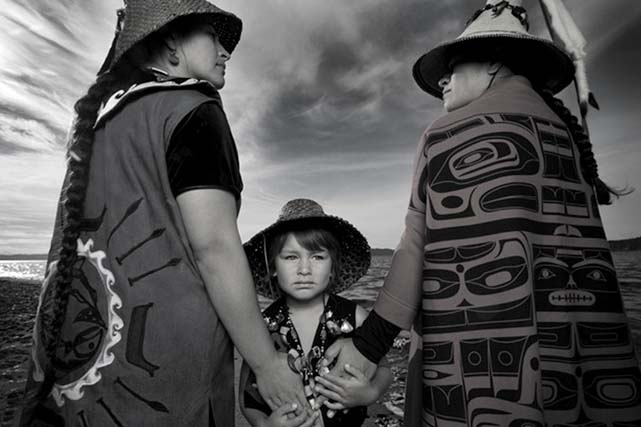
Darkfeather Ancheta is pictured with her sister and nephew at the edge of Tulalip Bay. They are wearing the traditional regalia that was prepared for their annual Canoe Journey. Every year, upward of 100 U.S. tribes, Canadian First Nations and New Zealand canoe families will make “the journey” by pulling their canoes to a rotating host destination tribe. Canoe families pull for weeks, and upon landing, there will be several days and nights of “protocol”: a celebration of shared traditional knowledge, ancestral songs, and sacred dances.
This celebration has been incredibly important to Darkfeather. She says, “It didn’t change me. It raised me. It shaped me. It’s just who we are, and where we come from…it revitalizes our cultural ways. There are so many teachings that go along with the relationship with the canoe. We take care of the canoe and it takes care of us. When we’re on the water, we all have to pull together. Everything is smoother when we all work together. The teachings that the elders gave to us – like, respecting ourselves, respecting each other, respecting other people’s songs, their dances, and their teachings – they teach us how to walk in the world. And the music and songs are so powerful. It’s all so beautiful. It touches you down into your soul. It helps you get through hard times, both in the water and in life”.
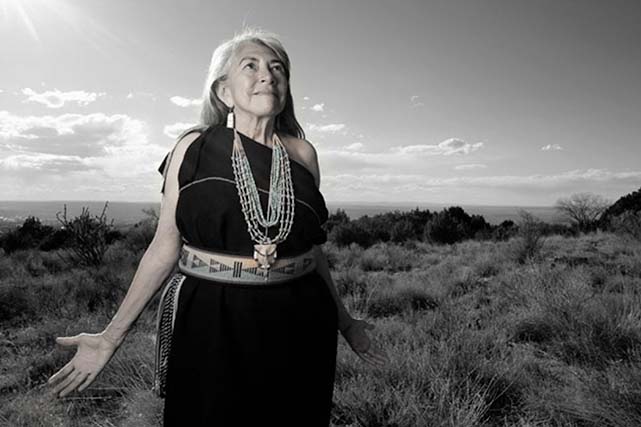
Dr. Mary Evelyn Belgarde is a retired professor of Indian education from the University of New Mexico. She has collaborated in establishing several charter schools focused on Indigenous education. She has raised funds to support thousands of Native students. She is very passionate about training culturally competent teachers to work within Indigenous communities. She is well-versed in the history of boarding schools and governmentally-engineered education systems of assimilation.
During our conversation she asked, “When are we going to stop asking our children to choose between cultural education and western education? I think we are ready to stop the assimilation process. The time to change is now.”
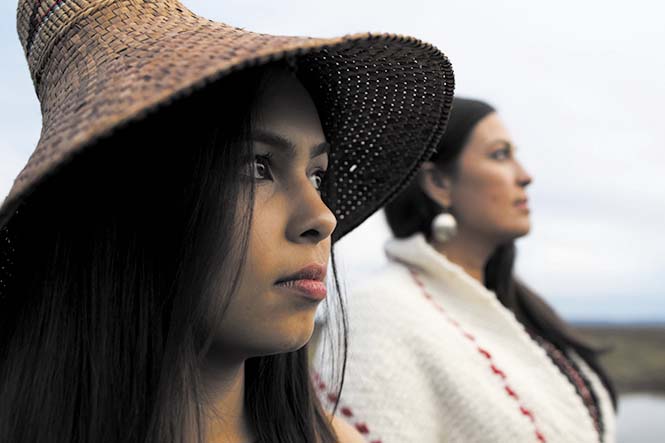
Former vice-chairwoman for the Tulalip Tribes, Deborah Parker is a prominent advocate for tribal women’s rights and well-being, as is her daughter, Kayah George. She advocated on behalf of Native women during the fight to reauthorize the Violence Against Women Act (VAWA), which was held up in Congress due to specific provisions that would protect Native women and tribal sovereignty.
Deborah said, “As a survivor of domestic violence, I knew that I would someday be able to help another person,” she said. “When you are asked to protect someone, when you are asked to protect a nation, that is what you do. You armor up. … For me, it will be a lifetime of this work. It will never stop because every woman is worth protecting. Every man and every woman deserves justice.”
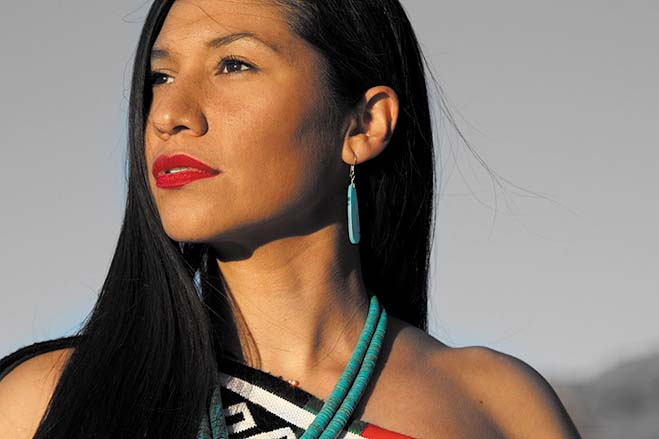
Calling Walwatoa (Jemez Pueblo), New Mexico home, Juanita is a community wellness advocate and works for her tribe’s community wellness program. She lives on her tribal lands, and feels grateful for the opportunity to serve her people. Born in Washington, DC while her mother was working for the Senate Committee on Indian Affairs, Juanita moved back to her community when she was young.
Her mother “wanted my brother and I to know the language and the culture, and that’s a big part of why I continue to reside on the reservation, because growing up it’s become a big part of who I am and my identity as a human being. Even though I’m mixed, I’m half Indigenous and half African American, I tend to identify more with the Indigenous side, only because I grew up on the reservation. Culture and family is why I’m here, and my mom is a big reason also, and that attachment to family and land is why I’m still here on the rez. I’m a rez kid at heart.”